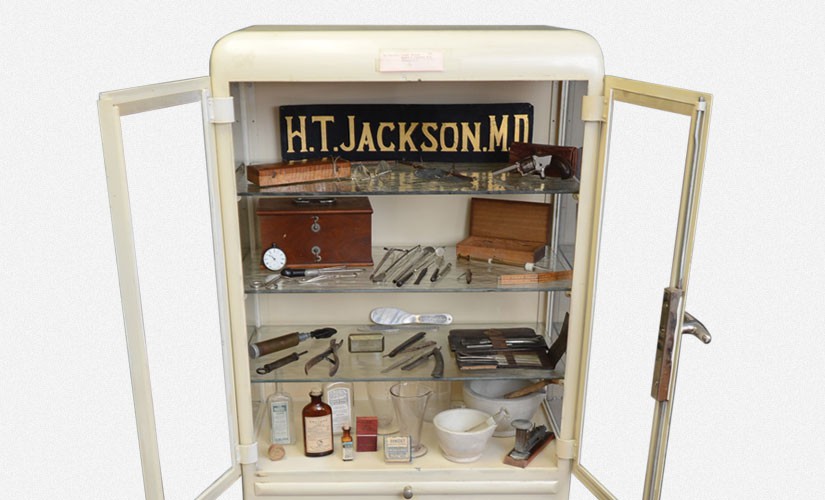It began with a phone call on a chilly February afternoon. San Francisco-based architect, Brian Grant, telephoned Linda Lohr, manager of UB’s History of Medicine Collection, and relayed a message from his father-in-law, retired family physician, Dr. Kenneth Felch (UB Medical School, 1961). Grant explained that Dr. Felch had some items he wished to donate to the History of Medicine Collection, including a cabinet which had originally belonged to Felch’s grandfather, Dr. Homer Truman Jackson, an 1881 graduate of UB’s Medical School who practiced medicine for many years in the small town of Verona, New York.
Felch had kept his grandfather’s cabinet in the waiting room of his own office for decades. “Everyone seemed to enjoy looking at it,” said Felch, “so I asked my son-in-law, Brian Grant, to look on the internet, and he located the UB History of Medicine Collection website.” Along with the cabinet, Felch had also saved many of his grandfather’s medical books and personal items, including a surgical kit, a handwritten “stock prescription” notebook, and Dr. Jackson’s black beaver top hat.
Felch thought these items might be interesting additions to the History of Medicine Collection, and Lohr was quick to respond. “Phone calls like this always excite us,” she says, “and I made arrangements to visit Dr. Felch in order to determine if we could accept his donation for UB’s History of Medicine Collection.”
On a lovely June day, Lohr and her colleague, senior assistant librarian Keith Mages, drove to Dr. Felch’s home in Lansing, NY, on the shore of Cayuga Lake. “Before enjoying lunch with Dr. and Mrs. Felch, we examined the items in the collection,” says Lohr. “We agreed that the cabinet, medical books and other items would make fascinating and important additions to our History of Medicine Collection.”
During the visit, Dr. Felch shared additional details about his grandfather, including the fact that in addition to serving as the town doctor in Verona, Jackson was also a church elder and an avid gardener. He grew herbs and medicinal plants such as foxglove, poppies, garlic, basil and thyme, and used his mortar and pestle and the small scale [to prepare his medicines].
“I never actually knew my grandfather, as he died when I was two,” Felch explained, “but I did know my grandmother and stayed with her when my parents were on vacation. I also learned about him from my mother. [She] talked of hearing the bells on his sleigh jingle when he went to deliver a baby in the winter. My grandfather’s office was in his house and had a private entrance. His office was also his library. He was a great reader. One of his favorite books was The Leather Stocking Tales by James Fenimore Cooper. (I still have the 5-book collection).”
One month later, on a hot, humid summer day, Lohr and Mages returned to Dr. Felch’s home. Their task: to carefully pack the collection items into boxes. “Our first challenge was moving the heavy, glass-fronted cabinet from the second floor to the first without destroying the stairs, the cabinet, or our backs!” Lohr recalls. “We placed a blanket underneath the cabinet, and carefully slid the cabinet down the stairs, one step at a time. Luckily, we accomplished our task without incident, but after hoisting the cabinet onto the dolly we’d brought along, we faced another hurdle: getting the cabinet safely up a steep incline and into the car. Despite several near mishaps and a couple of bruised arms, we successfully loaded the cabinet into our SUV, and soon pulled away with our new materials piled high to the roof.”
Returning to UB, Lohr and Mages carefully unpacked, sorted and cataloged each piece in the collection, including one of its most unusual items, the .22 caliber pistol that Dr. Jackson carried with him on house calls as a precaution. “Dr. Jackson, like many other rural 19thcentury physicians, had to be prepared for anything,” says Mages, “including wandering highwaymen who looked to take advantage of travelers on lonely country roads.” To ensure that the pistol would be displayed safely, Lohr contacted the University Police for permission to display the weapon in an approved manner. “The UB police were very helpful,” she reports; “they even gave us a lock for the gun!”
Now safely installed in the UB History of Medicine Collection, Dr. Jackson’s cabinet houses a selection of his medical instruments, along with family photographs and personal items, offering visitors, students and researchers a unique glimpse into the life of a country doctor in the early 20th century. In addition to the items displayed in the cabinet, the Homer T. Jackson Collection also includes handwritten notebooks from Jackson’s medical school classes, along with his suggested treatments for medical conditions and the preparation of medications, and his comments on articles from medical journals.
“My grandfather was in his 80’s when he died of natural causes; he had practiced medicine for 40 years,” recalls Dr. Felch. “When I went to UB, we already had two children. Buffalo’s training inspired me to become a general practitioner because of its diversity. I will always be grateful for the excellent professors and the family-centered orientation.” Linda Lohr is grateful, too. “We’re absolutely thrilled that Dr. Felch donated his grandfather’s wonderful collection to the History of Medicine Collection,” she notes, “We’re planning to create a digital collection in order to share these materials with a global audience. Stay tuned!” For more information on the items in Dr. Jackson’s Cabinet please contact Linda Lohr, Manager, History of Medicine Collection at (716) 829-5737 or via email: lalohr@buffalo.edu.
